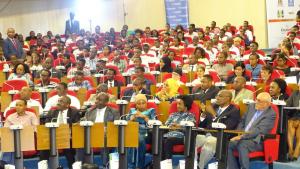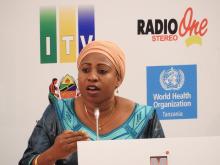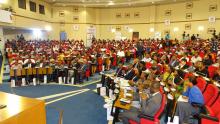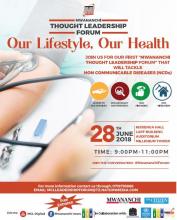WHO joins new drive to #beatNCDs in Tanzania
28 June 2018, Dar es Salaam: Seven in 10 deaths globally every year are from NCDs, the main contributors to which are tobacco use, harmful use of alcohol, unhealthy diets, and physical inactivity. More than 15 million people between the ages of 30 and 70 years die from NCDs annually. Low- and lower-middle income countries are increasingly affected, with half of the premature deaths from NCDs occurring in those countries. Many lives can be saved from NCDs through early diagnosis and improved access to quality and affordable treatment, as well as a whole-of-government approach to reducing the main risk factors.
This month, the Ministry of Health in collaboration with WHO participated in the launch of the Thought Leadership Forum on Non-Communicable Diseases hosted by Mwananchi Communications Ltd. under the theme “Afya Yetu, Mtaji Wetu”.
The one of its kind event brought together government leaders, policy-makers, diplomats, CEOs of organizations, students and the public with the aim to raise awareness on the impact of non-communicable diseases, their cost, and the actions that can be taken now to beat NCDs. The event was graced by the presence of the Hon. Minister for Health, Hon. Ummy Mwalimu, the Permanent Secretary for Health, Dr. Mpoki Ulisubisya and the WHO Representative a.i., Dr. Adiele Onyeze.
The Forum’s panels addressed a myriad of issues on how non-communicable diseases impact the nation, and the measures being undertaken to prevent and control these conditions.Themes that emerged from the day included the need for coordinated and coherent action from all sectors and the whole of society, as many of the key drivers of ill health lie outside the control of health ministries, systems and professionals. Non-State actors, including civil society and industry, have important roles to play.
Panelists spoke about these themes emphasizing that beating NCDs, and promoting health, are issues for everyone and across every area of government. Another key theme that emerged was that the bulk of NCD deaths could be prevented by action against tobacco, air pollution, unhealthy diets, physical inactivity, and harmful use of alcohol – as well as by improved disease detection and treatment.
During the three-hour-long session, attendees participated in the dialogue providing possible solutions to the challenges of uneven and insufficient progress to reduce premature deaths from NCDs; the influence of the private sector and limited health promotion for NCD prevention and control at community level.
Speaking at the event, the WHO Representative, Dr Adiele Onyeze commended the Government of Tanzania for creating such a forum to raise the profile of NCDs as an issue affecting national development. He commended the Ministry for engaging the private sector in raising public awareness on NCDs to the public and the Mwananchi Communications Ltd and ITV media for providing a means for promoting interventions for prevention and control of NCDs.
In his concluding remarks, Dr Onyeze spoke about the threatened economic and social growth as a result of NCDs. He underscored the importance of early diagnosis and improved access to quality and affordable treatment, as well as a whole-of-government approach in the fight against NCDs. The WR spoke on a set of WHO “best buys” and other cost-effective interventions that are available and proven to prevent or delay most premature NCD deaths. Dr Onyeze reassured the government of WHO’s continued commitment and support in this fight.
Giving opening remarks at the event the Honourable Minister thanked all partners for making NCDs fight a reality. She thanked the President of Tanzania for recognizing needs of her Ministry and allowing to increase budget allocation to support health-related plights. The Minister showed concern regarding the increasing burden of Non-communicable Diseases amidst the on-going battle with the communicable diseases. She cited efforts by the Ministry to improve cancer, heart and surgical services in the country and high level leadership demonstrated by the Honorable Vice President in promoting physical activity. The Minister called on every Tanzanian to take serious note of the experts’ guidance and ensure they abide to health advice on eating habits, exercising and early care seeking behaviour. She called on local government authorities to ensure they provide necessary space at community level for physical activities and awareness creation. She concluded by pledging continued commitment and support in the fight against NCDs.
The event was organized in partnership with the Independent Television, National Microfinance Bank, the Colosseum and the Bill and Melinda Gates Foundation.






